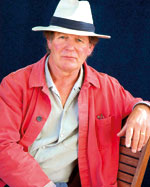Interview Michael Morpurgo, children’s author
Michael Morpurgo tells Ian Irvine about being one of the leading children's authors in Britain


Exquisite houses, the beauty of Nature, and how to get the most from your life, straight to your inbox.
You are now subscribed
Your newsletter sign-up was successful
Now 65, Michael Morpurgo is one of the country’s leading children’s authors, with more than 100 books to his name in a writing career of more than 30 years. He has won many awards and was the third Children’s Laureate, from 2003 to 2005. (Indeed, the very idea of a post of Children’s Laureate first originated during a conversation between Michael and the poet Ted Hughes.)
At the moment, two highly successful stage adaptations of his works are being performed: the critically acclaimed War Horse, about one horse’s history during the First World War, has been revived at the National Theatre and will run until March 18, before moving to the New London Theatre from March 28, and a new production, Why the Whales Came, set in the Scilly Isles in 1914, is currently at Birmingham Old Rep Theatre until January 24, before touring the country for much of 2009. ‘Since 1975, my wife, Clare, and I have lived in Iddesleigh in Devon, and there’s quite a lot of the place in my work. Part of War Horse is set here, and this month, lots of the villagers are coming up to the National to see the village on stage.
It’s England as it has been for 1,000 years. It’s quite a literary part of Devon. Ted Hughes, who was a great inspiration to me and an early encourager of my work, was a neighbour until his death in 1998, and the Torridge, at the end of my lane, which is one of the country’s great salmon rivers, is the setting for Henry Williamson’s Tarka the Otter.’ Soon after moving to Devon, in 1976, he and his wife set up a charity, Farms for City Children (it was Country Life’s charity of the year in 1985), because ‘Both my wife and I had important early experiences of the country.’
Michael was born in St Alban’s but spent time in his childhood on the coast of Essex at Bradwell juxta-Mare. ‘That was the first time I learnt about living in a small community and the working life of the countryside.’ Clare’s father Allen Lane, the publisher and founder of Penguin Books, ‘had a passion for Torridge, this little-known part of Devon, and she grew up with a great affection for the area’. So, when Michael and Clare were both teachers, and ‘trying to decide what was lacking in the lives of the city-based primary school children we taught’, they realised that one important factor was a deep experience of the English countryside especially ‘the working countryside.’
Following Allen’s death, Clare and Michael used the money he left her to begin the charity with the farm, Nethercott. ‘Over the years,’ says Michael, ‘we’ve raised more money and expanded.’ There are now two others: Lower Treginnis on the Pembrokeshire coast near St Davids and Wick Court in a bend on the River Severn in Gloucestershire. ‘For the past 30 years or so, I’ve been interweaving the writing of my stories with work for the charity, and Clare has spent much of the time fund-raising.’ As a result of their charity work, they were awarded the MBE in 1999. ‘We’ve now had more than 70,000 children coming to live and work on the farms proper working farms with real farmers.
They learn hands-on where their food comes from, so, by the end of a week, they go back knowing what an extraordinary place the countryside is, knowing about planting, harvesting, milking, mucking out, feeding the animals, herding sheep. These 8 to 12 year olds put in a 5–6-hour working day every day all week and work their little socks off.’
For more information, see www.farms4citychildren. co.uk. ‘War Horse’: www. nationaltheatre.org.uk; ‘Why the Whales Came’: www. oldreptheatre.org.uk
Exquisite houses, the beauty of Nature, and how to get the most from your life, straight to your inbox.
